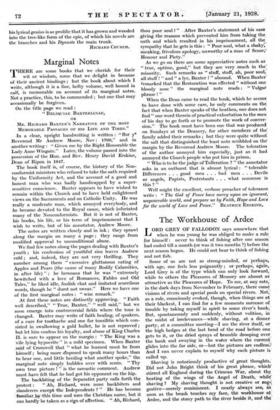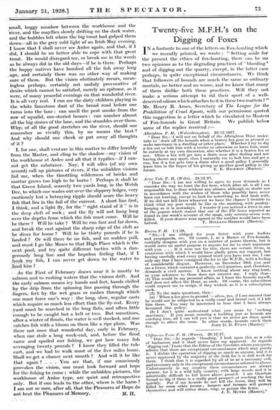The Workhouse of Ardee
IORB GREY OF FALLODON says somewhere that when he was young he was obliged to make a rule for himself: never to think of fishing after one season had ended till a month (or was it two months ?) before the next season began. He could not bear to think of fishing and not fish. Some of us are not so strong-minded, or perhaps, with age, one feels less poignantly; or perhaps, again, Lord Grey is of the type which can only look forward,' while to others the Pleasures of Memory are almost aa attractive as the Pleasures of Hope. To me, at any rate,i in the dark days from November to February, there come visions of rivers and special pools on special rivers. Not,' as a rule, consciously evoked, though, when things are at their blackest, I can find for a few moments surcease of trouble by taking myself in spirit to some river's bank,' But, spontaneously and suddenly, without volition, in the midst of irrelevances—while shaving, at a dinner party, at a committee meeting—I see the river itself, or the high hedges at the last bend of the road before one gets to it, or the dried sprays of bramble drooping over, bank the and swaying in the water where the current glides into the far side, or—but the pictures are endless:1 And I can never explain to myself why each picture is' called up. Shaving is notoriously productive of great thoughts.' Did not John Bright think of his great phrase, which stirred all England during the Crimean War, about thg beating of the wings of the Angel of Death, while shaving? My shaving thought is not creative or sug: gestive—merely reminiscent. I nearly always see, soon as the brush touches my face, the workhouse at' Ardee, and the stony path to the river beside it, and the small, boggy meadow between the workhouse and the 'river, and the mayflies slowly drifting on the dark water, and the bubbles left where the big trout had gulped them down—all in the grey cold light of an Irish May evening.
I -know that I shall never see Ardee again, and that, if I did, I should be no better able to cope with that great trout. He would disregard me, or break me in the weeds as he always did in the old days—if he is there. Perhaps the happy natives have bombed all the fish away long ,_ago, and certainly there was no other way of making sure of them. •But the vision obstinately recurs, mean- ingless perhaps, certainly not unduly provocative of desire which cannot be satisfied, merely an epitome, as it were, of many peaceful evenings on that wonderful river. It is all-very real. I can see the dirty children playing in the white limestone dust of the broad road before one turns into the lane : can smell the peat smoke from the row of squalid, one-storied houses : can number almost all the big stones of the lane, and the stumbles over them. Why;- of all the good stretches on the river, should one remember so vividly this, by no means the best ? And why should one check or put away all thoughts of it ?
' I; for one,' shall venture in this matter to differ humbly from the Master, and cling to the shadow—my vision of the workhouse at Ardee and all that it typifies—if I can- not get the substance. Nay, I will ultro (of my own accord) call up pictures of rivers, if the unbidden visions fail .me, when the throttling wilderness of bricks and mortar grows too high to be borne! Perhaps it shall be that Green Island, scarcely two yards long, in the Welsh Dee, to which one wades out over the slippery ledges, very cautiously lest a betraying ripple should scare the heavy fish that lies in the fail of the current. A short line first, I think, and a light fly, for the "right stand of it-" is in the deep cleft of rock ; and the fly will not hang long over the depths from which the fish must come. Will he be there'? Will he take ? Will he run fast and far down, and break the cast against the sharp edge of the cleft as he dives for home ? Will he be thirty pounds if he is landed ?Or Will there be no fish, and no sudden pull, . .
_ and-must-I go like Moses to that High Place which is the next pool, and try quite different tactics with a dan- gerously long line and the hopeless feeling that, if I hook my fish, I can never get down to the water to nd him ? • • As the First of February draws near it is mostly to salmon and to rushing waters that the visions drift. And the early salmon means icy hands and feet, hands chilled by the drip from the spinning line passing through the fingers, feet by- the wet grass or rushes through which one must force one's way : the long, slow, regular casts which require so much less effort than the fly-rod. Every -yard must- be searched in the long flats, and often little enough to be caught but a kelt or two. But sometimes, after a:winter of floods, the water is well stocked, and one catches fish with a bloom on them like a ripe plum. Was there not , once that wonderful day, early in February, when One stole a long week-end, and, before the flood -came and spoiled our fishing, we got how many fish -averaging twenty pounds? I know they filled the tub- cart, and we had to walk most of the five miles home. Shall we get a chance next month ? And will it be like that again ? . •. . You see that, if one consciously provokes the vision, one must look forward and hope for the fishing to come ; while the unbidden pictures, the workhouse of - Ardee type, are quiet and retrospective only. But if. one leads to the other, where is the harm ?
I am not so sure, after all, that the' Pleasures. of Hope do not beat the Pleasures of Memory. M. H,







































 Previous page
Previous page